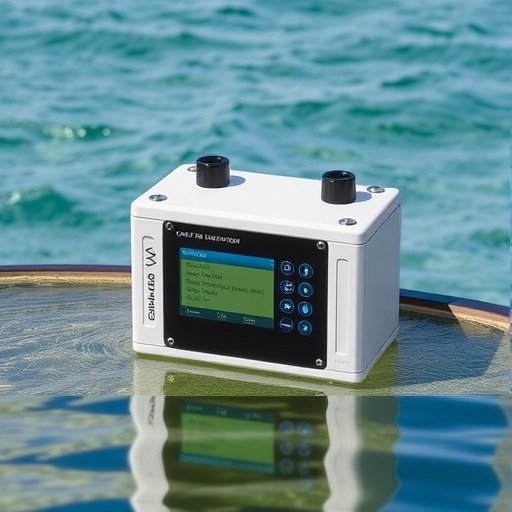In the rapidly evolving world of environmental monitoring, understanding carbon dioxide (CO₂) levels in our oceans is becoming increasingly vital. Researchers are continuously exploring innovative ways to measure this critical gas in marine environments. A significant breakthrough has been reported by Kubo, Tenpaku, and Toda in their latest study, which introduces a compact pCO₂ measurement system that utilizes a gas-permeable membrane. This cutting-edge technology enables effective observations in both underway and moored conditions, proving to be an essential tool for coastal water studies.
The interest in monitoring pCO₂ levels arises from its pivotal role in ocean acidification, a pressing issue that threatens marine ecosystems. As CO₂ levels rise in the atmosphere due to human activities, a significant portion of this gas is absorbed by the oceans. This chemical interaction alters the pH of seawater, negatively impacting marine life, particularly organisms like corals and shellfish that rely on calcium carbonate for their structural integrity. Therefore, having precise measurements of pCO₂ is crucial for understanding the broader implications on marine biodiversity.
One of the significant advantages of the system proposed by these researchers is its compact design, which allows for versatility in deployment. Traditional measurement systems are often bulky and require extensive setup, making them less feasible for continuous monitoring in diverse marine environments. In contrast, the compact pCO₂ measurement system can be easily integrated into existing observation networks or deployed on research vessels, enhancing its applicability in real-world scenarios.
Central to the functionality of this innovative system is a gas-permeable membrane that allows CO₂ to diffuse through, enabling accurate measurements without the need for large-scale infrastructure. This approach streamlines the collection of data, offering researchers a user-friendly means of monitoring pCO₂ levels over extended periods. Continuous data collection can significantly enhance understanding and predictive modeling of oceanic CO₂ dynamics, making this technology a game changer in marine research.
The research team’s methodology is robust, relying on established scientific principles while incorporating novel adaptations that enhance performance. By utilizing advanced materials for the gas-permeable membrane, they are able to optimize permeability rates and minimize response times. This allows for rapid and reliable measurements even in dynamic coastal environments where conditions can change quickly. Such advancements push the boundaries of what was previously achievable in marine CO₂ monitoring.
Furthermore, they conducted rigorous field tests in varying coastal conditions, demonstrating the reliability and accuracy of their system. The real-world applicability of their findings underscores the potential for widespread adoption within the scientific community. The ability to deploy this system for both underway and moored observations adds a significant layer of versatility, significantly expanding the scope of potential research projects focused on coastal marine ecosystems.
The implications of this research extend beyond mere technological advancement. Understanding pCO₂ levels in coastal waters can lead to improved management strategies for marine resources. As coastal areas are already experiencing the brunt of climate change effects, such as rising sea levels and increased storm intensity, integrating this monitoring system into conservation efforts could enhance resilience against environmental challenges.
Moreover, the insights gained from ongoing pCO₂ monitoring can inform policymakers, enabling them to make data-driven decisions aimed at mitigating the impacts of climate change. By equipping marine research organizations and environmental agencies with such advanced technology, there’s potential for a ripple effect—encouraging the development of additional innovative solutions tailored to combat pressing environmental issues.
In summary, the compact pCO₂ measurement system designed by Kubo, Tenpaku, and Toda represents a critical advancement in our ability to continually monitor oceanic carbon dioxide levels. As scientists grapple with the escalating consequences of climate change, tools like this offer a practical and efficient method for gathering data that can influence a broad range of environmental research and management strategies. This innovation not only serves the immediate needs of researchers but also paves the way for a future where the health of our oceans—and the myriad forms of life they support—can be more effectively safeguarded.
The urgency of addressing carbon dioxide emissions cannot be overstated, and as the research community embraces technologies like this gas-permeable membrane system, we edge closer to uncovering the complex interactions within marine ecosystems. Continuous improvements in measurement accuracy and system deployment will be essential as we seek to understand and mitigate the impacts of acidification on our oceans. Indeed, the ongoing commitment to marine science and monitoring will be indispensable as we navigate the future of environmental stewardship.
As researchers, policymakers, and the public grow increasingly aware of the importance of the oceans in climate regulation, innovations like this will be pivotal in facilitating a deeper understanding of marine carbon cycles. If these advancements can mobilize collective action toward reducing carbon emissions and protecting marine ecosystems, we may be setting the stage for significant achievements in combating climate change. The work of Kubo and colleagues is a testament to the intersection of science and responsive environmental action, reminding us of our role in the stewardship of the planet’s most precious resources.
In an age where scientific inquiry and technological advancement go hand in hand, the development of compact, efficient monitoring systems will prove essential for the future of environmental health. As the findings from this groundbreaking research circulate through scientific communities, the hope is that inspiration will spark new investigations, leading to even greater innovations in oceanographic research and conservation. With every advancement, we move closer to a sustainable future built on knowledge, understanding, and proactive measures toward preserving the delicate balance of our marine ecosystems.
Subject of Research: Measurement of carbon dioxide levels in coastal waters
Article Title: A compact pCO₂ measurement system using a gas-permeable membrane for underway and moored observations in coastal waters
Article References:
Kubo, A., Tenpaku, M., Toda, A. et al. A compact pCO2 measurement system using a gas-permeable membrane for underway and moored observations in coastal waters.
Environ Monit Assess 197, 1344 (2025). https://doi.org/10.1007/s10661-025-14813-w
Image Credits: AI Generated
DOI: https://doi.org/10.1007/s10661-025-14813-w
Keywords: Marine monitoring, carbon dioxide, pCO₂ measurement, gas-permeable membrane, ocean acidification, environmental science, coastal waters, innovative technology, sustainability, climate change.




